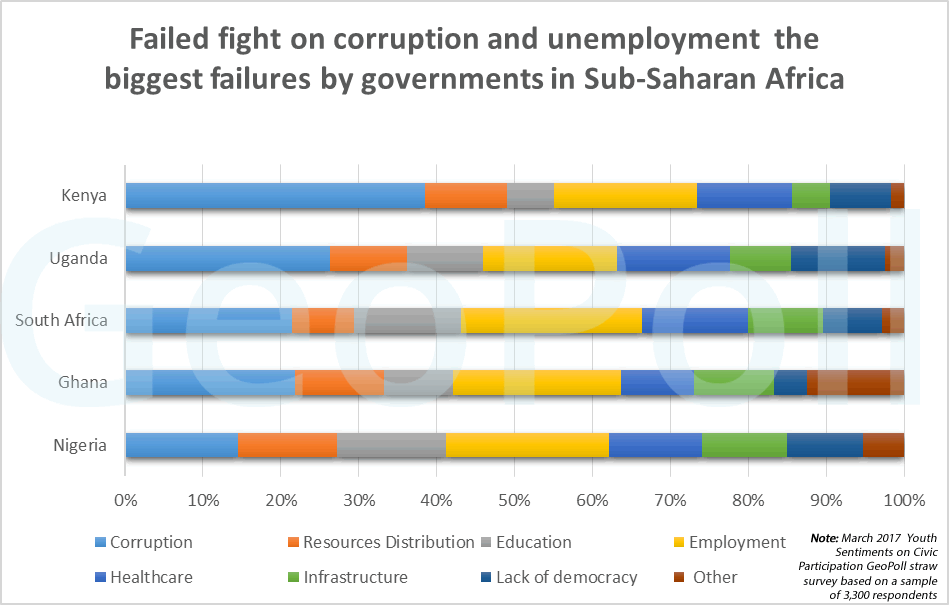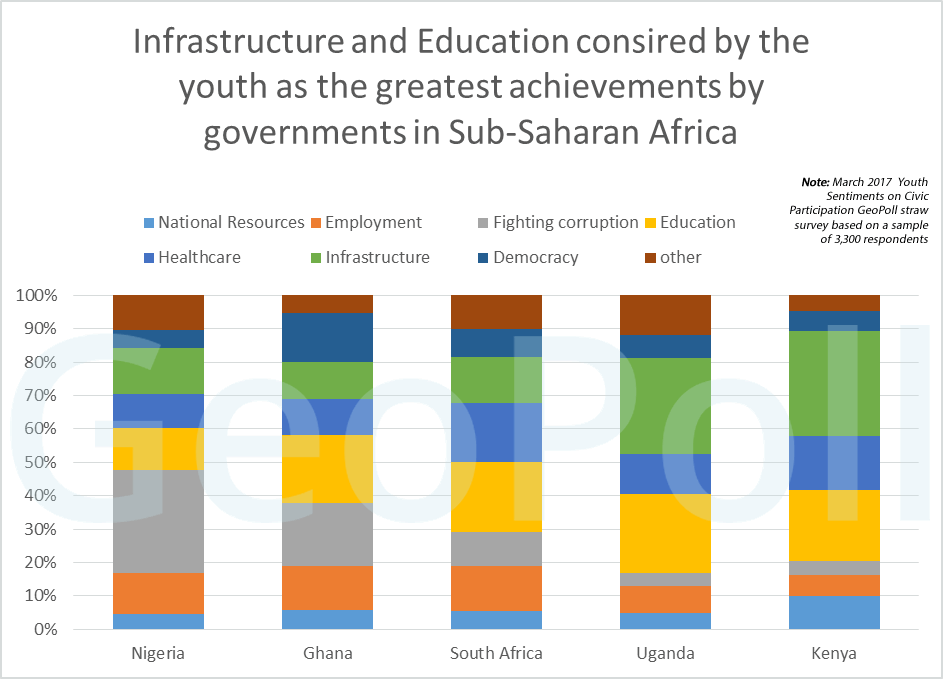- Contents
At 1.5 billion, today’s global youth (aged 15 to 34 years old) is the largest in history. They are driving changes in economic opportunities, development, and, increasingly, political systems. To better understand youth perceptions of their role in civic and political processes, we polled 3,300 youth across 5 sub-Saharan countries: Ghana, Kenya, Nigeria, South Africa, and Uganda. In these countries, youth account for 55, 60, 60, 53 and 68 percent of the adult population over 15 years old, respectively
GeoPoll found that despite an active and engaged youth, youth question the accountability of their governments and the role in which they can take as political participants. They do, however, identify and value governance—whether it manifests in service delivery, free speech, or voting.
Critical to understanding youth participation in civic and political processes, GeoPoll wanted to know how well youth trust the systems designed to facilitate these very processes. When asked to identify the biggest failure of the current government, nearly half of all participants identified corruption. This was identified as the primary concern in Ghana, Kenya, and Uganda; and the second biggest issue in Nigeria and South Africa, where respondents chose unemployment as a larger concern.

When further asked if the government represents the interest of one’s community, only one-third of respondents said “no” across all countries. Ghanaian respondents responded the most positively with 79 percent saying “yes.” Results were consistent across demographic groups with both men (64 percent) and women (62 percent) saying “yes” at high rates. Similar rates were found among subsets of age brackets among youth.
Despite these concerns, youth are civically active—exercising free speech and actively participating in democratic processes. Compared to other media sources, the top choice for the daily news source for youth respondents was social media (33 percent), aside from Kenya and Ghana where TV and Radio were more popular. Two-thirds of respondents noted that they post political opinions and viewpoints on social media.
Combining all 5 countries, 90 percent stated they were registered to vote and 71 percent noted that they voted in both the last national and local elections. Sixty percent noted they are affiliated with a specific political party, with 75 percent in South Africa.
Youth are optimistic about the role they can plan in their communities and in their government. More than 60 percent of youth polled are engaged in voluntary community service. The same proportion of respondents identified working with others in their community to help solve an issue. When asked about sentiments around the future of Africa depending on youth, 76 percent strongly agreed followed by another 14 percent who somewhat agreed.

They identify positive developments by their government: 27 percent of respondents reported that they consider infrastructure improvement among the top government achievements and another 20 percent reported improvements in education. Approximately 37 percent of respondents in Kenya and 32 percent
in Uganda reported that they considered infrastructure improvements an achievement, more than twice the other three countries.
Africa’s youth will play an increasing role in governance and civic participation. Identifying their perceptions and the best means to engage youth are critical steps to understanding the impact they can and will make in the future.
About GeoPoll Straw Polls
GeoPoll is the world’s largest real-time mobile survey platform, reaching a growing network of more than 320 million users in 30 countries worldwide on a deeply granular level and at unprecedented scale. Through partnerships with telecom providers—and a multimodal platform powered by text, voice and web-based communications—GeoPoll enables organizations to gather quick, accurate and in-depth insights on anything from consumer preferences to access to basic government services.
GeoPoll leverages its platform to engage mobile users through ad hoc “straw polls” that provide insights into real-time sentiments of current events. This GeoPoll rapid survey was conducted in March 2017 among 3,300 youth in Kenya, Uganda, South Africa, Ghana and Nigeria using the GeoPoll mobile application.
Straw Poll Specs
- Countries surveyed: Ghana, Kenya, Nigeria, South Africa, Uganda
- Language: English
- Mode: SMS, GeoPoll App
- Questionnaire length: 16 questions
- Median survey completion time: 20 minutes
- Sampling frame and approach: men and women, aged 15-34, drawn from GeoPoll’s user database based on web recruitment
- Total sample size: 3,300
- Fieldwork duration: 2 days
Photo credits: EPA/Nic Bothma
